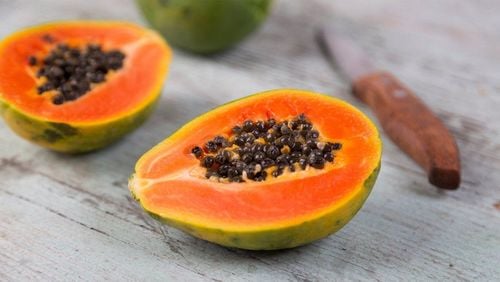Papaya is a fruit with a mild sweet taste, soft texture, green/yellow color, and a shape resembling a large pear, weighing around 1kg. Papaya adds versatility to recipes and can be used to make sauces, soups, or sweet and savory dishes. So, is eating ripe papaya good for you? The following article helps you understand the benefits of eating ripe papaya and whether consuming a lot of it is advisable.
1. Reasons to Eat Papaya Every Day
Papaya is an extremely healthy tropical fruit. It is rich in fiber and contains essential nutrients like vitamin C and vitamin A. Papaya is packed with antioxidants that can reduce inflammation, combat disease, and help you look younger. Below are eight health benefits of papaya:
1.1. Delicious and Nutrient-Rich
Papaya originates from Central America and southern Mexico but is now grown in many other parts of the world. It contains an enzyme called papain, which can break down tough protein chains in muscle meat. Because of this, humans have used papaya to tenderize meat for thousands of years.
If the papaya is ripe, it can be eaten raw. However, unripe papaya should always be cooked before consumption, especially during pregnancy, as unripe fruit contains latex, which may induce contractions. Papaya resembles a pear and can grow over 50 cm long. The skin is green when unripe and turns orange when ripe, while the flesh is yellow, orange, or red. The fruit also has many black seeds, which are edible but bitter.
A small papaya (152 grams) contains:
Calories: 59
Carbohydrates: 15 grams
Fiber: 3 grams
Protein: 1 gram
Vitamin C: 157% of the recommended daily intake
Vitamin A: 33% of the recommended daily intake
Folate (Vitamin B9): 14% of the recommended daily intake
Potassium: 11% of the recommended daily intake
Additionally, ripe papaya contains small amounts of calcium, magnesium, and vitamins B1, B3, B5, E, and K. Papaya also contains healthy antioxidants called carotenoids, particularly lycopene. Moreover, your body absorbs these beneficial antioxidants from papaya more effectively than from other fruits and vegetables.
1.2. Strong Antioxidant Properties
Free radicals are reactive molecules produced during your body's metabolism. They can promote oxidative stress, leading to many diseases. Antioxidants, including carotenoids found in papaya, can neutralize free radicals.
Studies have noted that fermented papaya can reduce oxidative stress in older adults and individuals with prediabetes, mild hypothyroidism, and liver disease. Additionally, many researchers believe that excessive free radicals in the brain are a significant factor in Alzheimer's disease. In one study, individuals with Alzheimer's who took fermented papaya extract for six months saw a 40% reduction in a biomarker indicating oxidative DNA damage, which is also linked to aging and cancer.
This reduction in oxidative stress is attributed to papaya's lycopene content and its ability to eliminate excess iron, known to produce free radicals.
1.3. Anti-Cancer Properties
Research suggests that lycopene in papaya may reduce cancer risk. It may also benefit those undergoing cancer treatment. Papaya may work by reducing free radicals that contribute to cancer development. Furthermore, papaya offers unique benefits that other fruits cannot. Among 14 fruits and vegetables with known antioxidant properties, only papaya exhibited anti-cancer activity on breast cancer cells.
In a small study of older adults with inflammation and precancerous stomach conditions, fermented papaya preparation reduced oxidative damage. However, further research is needed before making firm recommendations.
1.4. Supports Heart Health
Adding papaya to your diet can enhance cardiovascular health. Studies indicate that fruits rich in lycopene and vitamin C, like papaya, can help prevent heart disease. The antioxidants in papaya may protect the heart and improve the protective effects of "good" HDL cholesterol.

In one study, individuals who consumed fermented papaya supplements for 14 weeks had reduced inflammation and better “bad” LDL - to - “good” HDL cholesterol ratios compared to those who took a placebo. This improved ratio is linked to a lower risk of heart disease.
1.5. Reduces Inflammation
Chronic inflammation is the root cause of many diseases, and unhealthy food and lifestyle choices can promote inflammation.
Studies have shown that fruits and vegetables rich in antioxidants, like papaya, help reduce markers of inflammation. For instance, one study noted that men who increased their intake of carotenoid-rich fruits and vegetables significantly lowered their CRP levels, a specific marker of inflammation.
1.6. Enhances Digestive Health
The papain enzyme in papaya can make protein easier to digest. Tropical communities regard papaya as a remedy for constipation and symptoms of irritable bowel syndrome (IBS).
In one study, individuals who consumed a papaya-based formula for 40 days significantly improved constipation and bloating symptoms. Papaya seeds, leaves, and roots have also been shown to treat ulcers in animals and humans.
1.7. Protects Skin from Damage
Besides keeping your body healthy, papaya can also keep your skin firm and youthful. Overactive free radicals are thought to be responsible for wrinkles, sagging, and other skin damage that occurs with age. Vitamin C and lycopene in papaya protect your skin and may reduce these signs of aging.
In a recent study, lycopene supplementation for 10–12 weeks reduced skin redness caused by sun exposure, a sign of skin damage. In another case, older women who consumed a combination of lycopene, vitamin C, and other antioxidants for 14 weeks saw measurable and visible reductions in facial wrinkle depth.
1.8. Delicious and Versatile in Recipes
Papaya has a unique flavor that many people love. However, ripeness is key. An unripe or overripe papaya can taste very different from a perfectly ripe one. At peak ripeness, papaya should range in color from yellow to orange-red, with a few green spots being acceptable. Like avocados, its skin should yield slightly under gentle pressure.
Its flavor is best when chilled, so refrigerate it whenever possible. After washing, cut it lengthwise, scoop out the seeds, and remove the flesh with a spoon like cantaloupe or honeydew.

Papaya is incredibly versatile and can complement other foods to enhance its flavor. Here are some simple recipe ideas using a small papaya:
- Breakfast: Halve it and fill one side with Greek yogurt, then top with blueberries and chopped nuts.
- Appetizer: Slice into strips and wrap each strip with ham or prosciutto.
- Salsa: Dice papaya, tomato, onion, and cilantro, then mix with lime juice.
- Smoothie: Blend cubed fruit with coconut water and ice until smooth.
- Salad: Dice papaya and avocado, add cooked diced chicken, and mix with olive oil and vinegar.
- Dessert: Combine chopped fruit with 2 tablespoons (28 grams) of chia seeds, 1 cup (240 ml) of almond milk, and 1/4 teaspoon vanilla. Mix and refrigerate before serving.
2. Potential Side Effects of Eating Papaya
While papaya is healthy and low in calories, some side effects may occur in certain individuals. Note that unripe papaya contains a high amount of latex, which decreases as the fruit ripens. Pregnant women should avoid eating papaya because the latex may cause uterine contractions and premature labor.
People diagnosed with latex allergies are at a higher risk of also being allergic to papaya latex. Signs of papaya latex allergy include rashes, itching, nasal congestion, wheezing, and chest tightness.
In severe cases of latex allergy, eating papaya can cause anaphylactic shock or severe breathing difficulties.
While papaya is a good source of fiber and aids digestive health, eating too much may have a laxative effect, causing diarrhea and stomach cramps. If you experience loose stools or stomach issues after eating papaya, consult a doctor and consider reducing your intake to see if symptoms improve.
Additionally, some evidence suggests that papaya seeds may act as a spermicide and reduce sperm motility. Therefore, men trying to conceive should avoid eating papaya seeds, as they may hinder conception.

Papaya is rich in valuable nutrients and has a delightful taste. Its powerful antioxidants, such as lycopene, may reduce the risk of various diseases, especially those that develop with age, like heart disease and cancer. It can also combat visible signs of aging, keeping your skin smooth and youthful. Although some unwanted side effects exist, primarily due to latex allergy, papaya is generally a food we should incorporate into our daily diet.
For more health-related information, visit the Vinmec website (www.vinmec.com) and leave your details for doctor consultations when needed.
To arrange an appointment, please call HOTLINE or make your reservation directly HERE. You may also download the MyVinmec app to schedule appointments faster and manage your reservations more conveniently.













